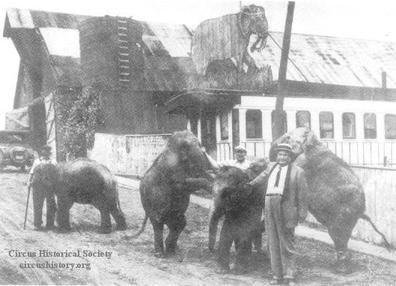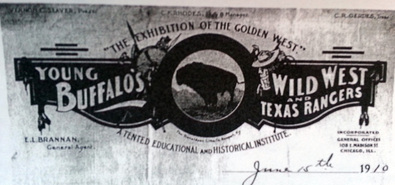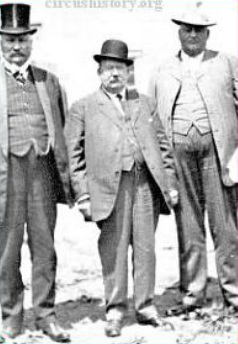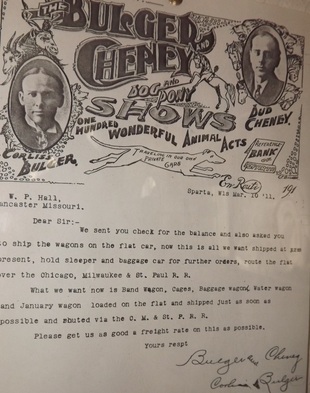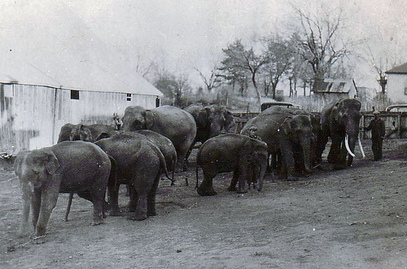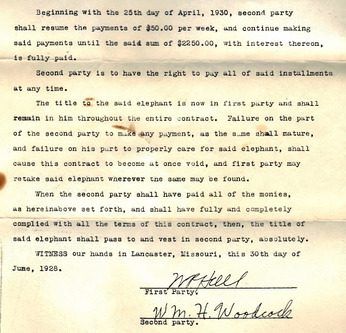“Then one day I said to myself, I’ll buy a show. And so I bought one. Sold it in the spring, and the next fall bought another. And so forth and so on,” ~William Hall
New York Tribune, Feb. 6, 1921
“Despite the gay splendor of his property and his diamond jewelry, Hall kept his office in an old coach that had been part of the Yankee Robinson Circus. It was rumored that this rail car was part of Lincoln’s funeral train. Possessed of no paint at all, the coach formed the base for a large wooden elephant, the Hall landmark.” |
Although Hall was a shrewd businessman, he had a soft spot for small traveling circuses. This is why he pieced out, sold, or leased equipment and animals to them. This innovative idea enabled these circuses to succeed, thus changing their future, as well as the future of the circus industry.
"Hall revolutionized the process of leasing circus acts out that still occurs to this day. No one had ever done that before. There are privately owned acts that have always been independent contractors, but Mr. Hall leased out acts, his elephants predominantly, for periods of weeks or months along with a trainer, and they would then be returned after the contract had been fulfilled. This still occurs to this day with several circus like the Carson & Barnes Circus leasing their elephants to the Kelly-Miller Circus and then acting as a subcontractor to bring their elephants to Shrine Circuses, Fairs, and Parks."
Circus Historian Bob Cline, personal interview, 2013
"Hall's operation was essentially a department store for showmen." |
"The fact that Hall leased equipment was a great benefit to showmen. Owing to the very high risk and failure rate of showmen, they could not go to a local bank for funds to expand. Hall made this possible. Smaller showmen could expand, so long as they were successful. If they did not thrive, all of their holdings could end up back in his possession through foreclosure proceedings. One thing was for certain, Hall kept on top of legal issues, always having proper paperwork in place on his sales and leases. In that regard he was likely ahead of his time." |
“It is estimated that three-fourths of all the shows then touring |
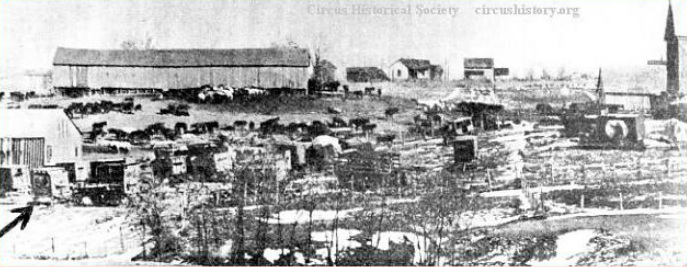
"This exceptional view of the Hall Farm appeared in the March, 1918 issue of St. Nicholas Magazine, a children's publication. An old Campbell Bros. tableau is identified by the arrow and a shell bandwagon, possibly the Van Amburgh, is on the far right covered by a canvas." Fred D. Pfening, III, photo by Joe Bradbury, Richard E. Conover archives
"There were other dealers in used circus and traveling show equipment besides Hall, but none were as enduring and carried the breadth of horses and elephants as did the Lancaster dealer. He served as something of a 'supply reservoir' of equipment and beasts for showman, absorbing it into Lancaster when shows failed, and leasing and selling it as shows desired to start operations or to expand. Almost every business endeavor has someone that acts as the supply reservoir. Hall was the best known to traveling showman."
Fred Dahlinger, Jr., Curator of Circus History, John and Mable Ringling Museum of Art
"Circuses Winter in Lancaster," Marilyn Foreman, Schuyler County Hall Museum Curator
Elephants
“I would have certainly placed elephants at the bottom of the list of possible things in Missouri, but you probably knew before I did, that Schuyler County proudly possesses as her first citizen the proprietor of one of the largest wild animal farms in the whole world, Col. William P. Hall of Lancaster, the circus merchant, who buys and sells railroad shows like a boy ‘swaps’ marbles. Mr. Hall is the largest individual owner of elephants on the globe and he controls the market on elephants in the western hemisphere.”
J. Kelly Wright, Farmers’ Institute speaker of the Missouri Board of Agriculture. University Missourian (Columbia) April 12, 1915
